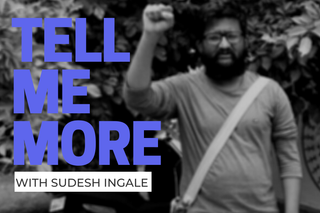
Tell Me More: Talking Dissent and Hope In Farmer’s Movements With Sudesh Ingale
“I think farmers are in a great position to educate people who sit at home and don’t really care about what’s going on around them.”

In The Swaddle’s interview series Tell Me More, we discuss crucial cultural topics with people whose work pushes societal boundaries.
Sudesh Ingale is a poet, grassroots organizer and the director of Parisar Foundation, an organization focused on environment education and healthcare. He also works with the All India Kisan Sabha for farmer welfare and advocacy in Osmanabad, Central Maharashtra. The Swaddle’s Aditi Murti spoke to Sudesh about how mobilization works in farmer’s movements, and about the long-term potential of the current anti-farm bill protests.
The Swaddle: Could you tell us a little about why you chose to work with farmers and the Kisan Sabha?
Sudesh Ingale: I have a master’s in economics and founded an NGO two years ago to work on the environment and healthcare. When we did healthcare camps in rural regions, we met a lot of farmers. If you explore the region I’m in right now — Osmanabad — you’ll realize that economy of the region is dependant on agriculture. In fact, wherever you go, everything comes back to the importance of agriculture only, I think. From there, I asked around a bit about farmer’s unions and found out that some farmer’s unions and the Kisan Sabha there were active there, but weak. Around 15-20 years ago, farmers had stronger unions here, but globalization and an increase in migration to Mumbai and Pune cost them much of their strength. But, I really liked the way the organization worked — very structured and democratic. Previously, I’d worked with the Student’s Federation of India when I was in college in Delhi, so this was sort of familiar ground for me. Ever since this particular set of farm bills passed (three bills collectively called the Indian Farm Reforms of 2020), we’ve been naturally meeting a lot more to figure out the next steps.
TS: What are the biggest concerns that farmers have faced in your region in 2020? What concerns are frequently shared by women farmers?
SI: There are some major issues that we’re working on as of now. We’re focused on fast-tracking compensation for the soybean crops that were damaged due to Cyclone Nisarga. We want waivers up to Rs. 50,000 for outstanding debts, large electricity bills, an employment guarantee scheme, and insurance for kharif crops. We’re also working to seek approvals for new wells, drip irrigation, and sprinkler irrigation-related subsidies and to get new ration cards issued.
With respect to women farmers, a major issue, of course, is their husband’s suicides. Maharastra has suffered this problem for a long time, and one person’s death wrecks the entire family. It’s an extraordinarily hard situation — you simply cannot define it. Unfortunately, we haven’t specifically focused on issues related to women farmers in particular in our union yet, but we do recognize that we must mobilize them too. Women do the same amount of farm work that men do and yet receive less pay. Especially if they’re daily wage labourers — they’re making something less than Rs. 50-100 daily only.
TS: There’s enormous tension between farmers and private players, or even with the idea of privatization. How do privatization and the passing of the new farm bills affect life on an everyday basis for farmers?
SI: So in the region I work in, there’s the APMC (Agricultural Produce Market Committee) which works really well for farmers. The new farm laws will completely destroy the APMC. Till the farm laws were passed, the APMC assured minimum support prices for the crops that farmers sell. Now, farmers don’t have to sell their first produce to the APMC, which means they’re more open to exploitation. There’s a well-processed chain of food procurement at APMCs already, which is why most farmers are against any form of extra interference from private players.
Although I do need to point out that not all APMCs work perfectly — some are corrupt and some have unfair elections. But, rendering the APMC powerless means removing an answerable body between the farmer and the government, right? For example, you must have heard about the cases in Nashik a few months ago, where a trader duped farmers by giving them cheques that bounced. That’s the fear — this can happen anywhere.
The major problem with privatization is that private companies get to decide the price of the produce. The producer must always decide their price, right? Obviously, private companies have no incentive to care about this — they need profit, so they’ll buy crops at the lowest possible price. That’s where the government is supposed to come in. The most basic demand is a minimum income — whatever our costs are, we should always get 1.5 percent more. Now if there’s a minimum price guarantee, it also helps the farmer plan for the next year because the farmer is sure of the money that will come in. If there’s no base price or concrete assurance that the crop will sell, how will the farmer plan for future crop cycles? That planning is imperative to add structure to a farmer’s life. We’re not asking for more, we’re literally asking for the minimum. Even while doing business with private players, we’re okay with strict regulations and clear guidelines to prevent foul play — but that’s simply not there.
Related on The Swaddle:
Tell Me More: Talking Media Ethics and Representation With Kavita Devi, Editor of Khabar Lahariya
TS: In face of adversity, how do farmers currently work to defend their rights?
SI: So with respect to the Kisan Sabha, there’s a committee in every village, and there are elections each year to create this committee. New members are recruited each year, and there’s a strong focus on education for everyone. Whenever there’s a new law passed, we sit down and talk about every single pro and con of that law. If there’s a law that offers particular benefits for farmers, we make sure they know of it. A lot of farmers are extremely insightful and knowledgable about issues that surround agriculture — I’d say even more than people with Ph.D. degrees sometimes. There’s also a strong feeling of nativism among them, as a means to protect each other. With respect to farmers as a collective, they come together every three months, and they hold meetings to discuss major issues like the problems I mentioned above.
Strikes and protests are quite common — I’d say once every two or three months for either local, state or national issues. We recently held a strike on November 26th as a part of the national Mazdoor Kisan. If something happens at the sub-district (taluka) level then we go straight to the tehsildar’s office. If it’s a serious issue, we go to the district collector’s office — and let’s just say we end up doing this quite often because the problems keep coming. These protests are quite democratic — generally what we do is we mobilize the workers — we tell them where we’re going, what we’re doing, why we’re doing it, we give our demands to the person in charge — be it the tehsildar or the district collector — and we make sure to get a receipt acknowledging these demands. In case these demands aren’t met, then we protest on the roads.
TS: It sounds like protesting unfair policies take up an enormous amount of time and energy. How does this negatively affect farmer’s day-to-day life?
SI: It particularly hurts daily wage workers the most because they lose money. So we try our hardest to only bring along people who are able to make adjustments regarding their daily work. We desperately need to mobilize far more than we already do in order to fight unfair laws and excessive privatization, but a lot of individuals can’t make it because they have to work or take care of children or family at home. However, women do come — I’d say 20% of women will show up for protests if it’s a group of 100. But if people can’t come for these protests, they do come for village meetings in order to discuss issues.
Related on The Swaddle:
Between Unpaid Agricultural, Domestic Labor, Women Lack Time, Energy to Feed Children
TS: Considering the current nationwide farmer protests going on right now, what do you see in the future of farmers’ movements in India?
SI: Personally, I’ve received enormous inspiration from these protests that farmers carried out in North India and in Maharashtra. In Maharashtra — recently farmers from more than 20 districts gathered in Nashik to march together to Delhi. I think farmers are in a great position to educate people who sit at home and don’t really care about what’s going on around them — specifically about what’s wrong and why it’s important to fight back. I see an incredible future for farmer movements and I don’t see any potential end to it. There’s this saying — hum kehte hai krishi pradhan lekin hum hai kursi pradhan (We want to put farmers first, but we end up putting politicians first). This is unfortunately true, and considering this, the farmer is bound to stand up for his rights. You can see it in the back and forth the farmers are having with the government and how the government won’t budge. So yes, of course, farmers will stand up.
This interview has been condensed and edited for clarity.
Aditi Murti is a culture writer at The Swaddle. Previously, she worked as a freelance journalist focused on gender and cities. Find her on social media @aditimurti.
Related


Tell Me More: Talking Dissent And Hope In India’s Art World With Meenakshi Thirukode
